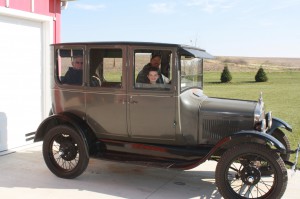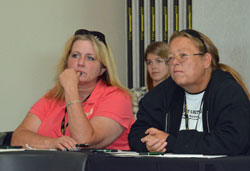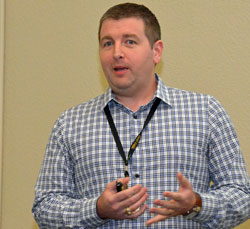Turns out that high-oleic soybean oil may be as good for motors as it is for hearts.
 A new collaboration announced today between Monsanto and Biosynthetic Technologies is expected to increase demand for high-oleic soybean oil and create new opportunities for Vistive® Gold soybean growers.
A new collaboration announced today between Monsanto and Biosynthetic Technologies is expected to increase demand for high-oleic soybean oil and create new opportunities for Vistive® Gold soybean growers.
The collaboration creates an opportunity for use of Monsanto’s Vistive® Gold soybean oil in production of biosynthetic lubricant oils. Biosynthetic Technologies, in collaboration with USDA scientists, has developed an entirely new class of bio-based synthetic oils that match or exceed the performance characteristics of the highest quality petroleum-based oils currently used in the automotive and industrial lubricant sectors.
“We have tested numerous feed stocks as part of our ongoing research and discovered excellent results using high-oleic soybean oils, in particular Vistive® Gold,” said Allen Barbieri, chief executive officer of Biosynthetic Technologies. “This is an important collaboration as we move forward with our other global partners to launch their first lines of domestically-sourced, renewable biosynthetic lubricants. High-oleic soybean oils are a cost-competitive alternative to many of the feed stocks we’ve explored, and working with Monsanto is a natural fit, given our shared commitment to sustainability and the potential for this product.”
Barbieri noted that Biosynthetic Technologies offers two product lines: LubriGreen® Biosynthetic Oils used in the automotive and industrial lubricants sector, and Coco EstolideTM esters for products used in the personal care and cosmetics sectors. The company is in the final stages of successful fleet testing and certification of LubriGreen biosynthetic motor oils synthesized from high-oleic oils such as Vistive® Gold. These LubriGreen base oils are also being used by several major oil companies to formulate and commercialize the first bio-based, biosynthetic motor oils ever sold by these companies.
“I’m very excited about the industrial applications possible with high oleic soybean oil,” said John Motter, a Jenera, Ohio, soybean farmer and United Soybean Board Director. “Multiple uses of high oleic oil create greater demand for American soybean farmers and make our products more competitive in the world market. Seed companies are putting the high oleic trait into their best genetics, and these soybeans will yield right up there with anything else farmers are going to grow.”
Read more from Monsanto.
![]() ZimmPoll is sponsored by Rhea+Kaiser, a full-service advertising/public relations agency.
ZimmPoll is sponsored by Rhea+Kaiser, a full-service advertising/public relations agency.










